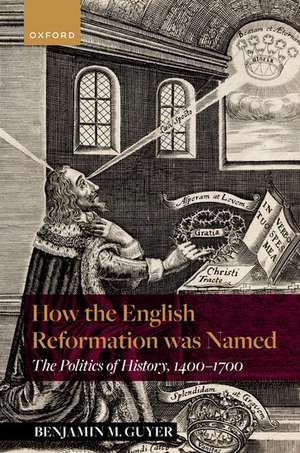How the English Reformation was Named: The Politics of History, 1400-1700
Autor Benjamin M. Guyeren Limba Engleză Hardback – 7 iul 2022
Preț: 498.96 lei
Preț vechi: 612.64 lei
-19% Nou
Puncte Express: 748
Preț estimativ în valută:
95.48€ • 99.08$ • 79.81£
95.48€ • 99.08$ • 79.81£
Carte disponibilă
Livrare economică 11-17 februarie
Preluare comenzi: 021 569.72.76
Specificații
ISBN-13: 9780192865724
ISBN-10: 0192865722
Pagini: 236
Ilustrații: 2 black and white figures
Dimensiuni: 161 x 240 x 18 mm
Greutate: 0.52 kg
Editura: OUP OXFORD
Colecția OUP Oxford
Locul publicării:Oxford, United Kingdom
ISBN-10: 0192865722
Pagini: 236
Ilustrații: 2 black and white figures
Dimensiuni: 161 x 240 x 18 mm
Greutate: 0.52 kg
Editura: OUP OXFORD
Colecția OUP Oxford
Locul publicării:Oxford, United Kingdom
Recenzii
This is a thought provoking first book which will reignite conversations about the relationship between language and history.
Guyer has made a significant contribution to the field of Reformation studies and its evolving historiography.
A smashingly successful analysis of the religious changes in late medieval and early modern England that commonly and conveniently are called "the English Reformation".
The best traditions of faithful learning are brought forward with good energy here in ways that would make his [Benjamin Guyer] predecessors Booty, Collinson, Lake, Marshall, and Ozment proud.
Guyer's How the English Reformation was Named is an insightful reminder that history is rarely as simple as our inherited narratives might lead us to believe
This study offers a range of valuable insights into the Reformation era and the English Reformation in particular...Guyer has made a significant contribution to the field of Reformation studies and its evolving historiography.
Guyer prompts us to think critically and carefully about the terms upon which we habitually rely and reminds us that the process of naming historical events is not neutral. To understand this inheritance is better to understand the religious upheavals of the early modern period and their treatment at the hands of generations of historians.
Guyer turns a useful contribution to church history into a guide to sixteenth- and seventeenth-century Protestant sources.
This book is sure to spark conversation amongst those interested in the English Reformation and its legacy.
The book nevertheless presents a good deal of new information and posits an interesting case for where the idea of the English Reformation as we know it today came from.
If a book's contribution is measured by the intensity of conversation it can raise, or the careful and expansive use of sources that are not often used in the same book, not tomention the breathtaking coverage of the period that many specialists fear to tread, Guyer's first book is an absolute success.
Guyer has made a significant contribution to the field of Reformation studies and its evolving historiography.
A smashingly successful analysis of the religious changes in late medieval and early modern England that commonly and conveniently are called "the English Reformation".
The best traditions of faithful learning are brought forward with good energy here in ways that would make his [Benjamin Guyer] predecessors Booty, Collinson, Lake, Marshall, and Ozment proud.
Guyer's How the English Reformation was Named is an insightful reminder that history is rarely as simple as our inherited narratives might lead us to believe
This study offers a range of valuable insights into the Reformation era and the English Reformation in particular...Guyer has made a significant contribution to the field of Reformation studies and its evolving historiography.
Guyer prompts us to think critically and carefully about the terms upon which we habitually rely and reminds us that the process of naming historical events is not neutral. To understand this inheritance is better to understand the religious upheavals of the early modern period and their treatment at the hands of generations of historians.
Guyer turns a useful contribution to church history into a guide to sixteenth- and seventeenth-century Protestant sources.
This book is sure to spark conversation amongst those interested in the English Reformation and its legacy.
The book nevertheless presents a good deal of new information and posits an interesting case for where the idea of the English Reformation as we know it today came from.
If a book's contribution is measured by the intensity of conversation it can raise, or the careful and expansive use of sources that are not often used in the same book, not tomention the breathtaking coverage of the period that many specialists fear to tread, Guyer's first book is an absolute success.
Notă biografică
Benjamin M. Guyer earned his doctorate with Honours at the University of Kansas in 2016 under the supervision of Jonathan Clark. A lecturer in the Department of History and Philosophy at the University of Tennessee at Martin, he has published multiple essays and is co-editor of two books.
